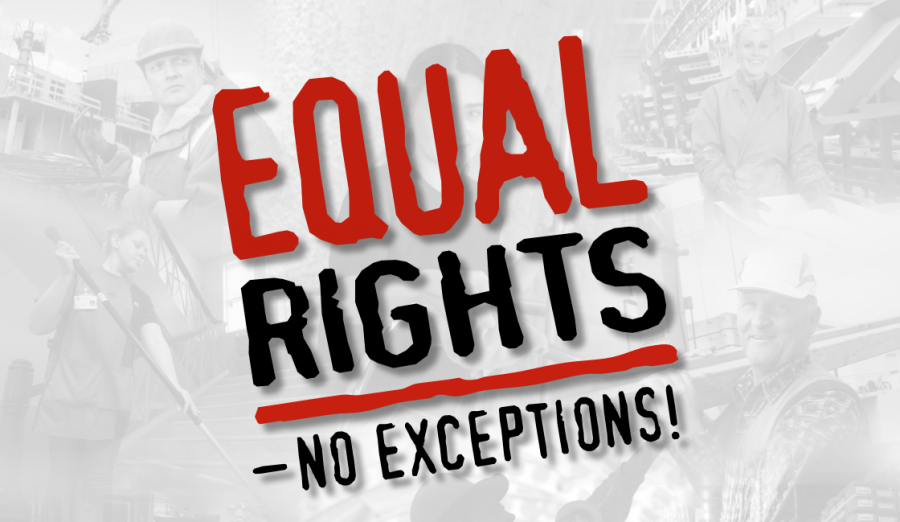The Icelandic Confederation of Labour (ASI) is by far the largest confederation of workers in Iceland covering the private sector and parts of the public sector. In the beginning of 2016, the Icelandic Confederation of Labour (ASI) together with its affiliates launched a project called Equal Rights – No Exceptions. It is anticipated that the project will be a permanent and integrated part of trade union work in Iceland.

The Equal Rights – No Exceptions [1] initiative was created as a response to changes in the wake of the economic boom in Iceland, as well as to globalisation and changes in the labour market. These changes have led to a significant increase in foreign workers in Iceland, especially in the construction industry, tourism and other service sectors. It is estimated that more than 10% of the labour force is now foreign, and the number is expected to grow in the coming years.
The vast majority of the foreign workers come from Eastern Europe and Asia where wages are much lower and employment rights are poor compared to Iceland. Additionally, the industrial relations system is less developed in those countries, collective agreements are often non-existent, union membership is low, and trade unions are weak [2].
This has resulted in social dumping on the Icelandic labour market by both foreign service providers and temporary work agencies as well as by Icelandic companies. Foreign workers are often the most affected. Equal Rights – No Exceptions is the trade union’s response to this development.
On the one hand, Equal Rights – No Exceptions is an information, surveillance and follow up project. On the other, it is directly linked to the trade union’s efforts to strengthen legislation, rules and enforcement that protect the rights of foreign workers in Iceland.
Spreading information
The ASI has produced several publications and pamphlets especially aimed at foreign workers and the companies employing them, in different languages, stating their rights and obligations. These publications have been distributed in work places, in public places and in all stores operated by the country’s largest supermarket chain. The material also links to websites with more information.
With the help of the foreign nationals’ own communities, the information has also been distributed on social media and directed at different groups of foreigners living and working in Iceland.
Workplace visits and monitoring
The main activity of Equal Rights – No Exceptions is workplace visits and monitoring. As sanctioned by the Act on Workplace ID Cards and Inspection [3], inspectors from the trade unions visit workplaces around Iceland to distribute information about collective agreements and other worker rights. The aim is also to verify that the workers enjoy the wages and rights they are entitled to. If minor improvements are necessary, the inspectors try to negotiate with the employer. If bigger issues come up or if the employer is suspected of intentionally and/or seriously violating collective agreements and workers’ rights, the case is handed over to the trade unions’ offices which investigate the case.
Collaborating with the authorities
An important part of Equal Rights – No Exceptions is the collaboration that has formed between the trade unions and relevant authorities, both at a national and local level. The collaboration, which is both formal and informal, covers dialogue and policy making, exchange of information, analysis of the situation, and organisation and execution of workplace inspections. The following authorities have participated:
The workplace visits are organized based on common analysis and risk assessment. During joint workplace visits, each party has specific tasks based on their role and authority. Together they assess the outcome and a possible follow up. This collaboration has been important for limiting social dumping, tax fraud and illegal activities on the labour market.
The Icelandic Confederation of Labour has also collaborated with the Icelandic Tourist Board on awarding the official quality label Vakinn to tourist companies. A company can only be given the award if the respective trade union concludes that there are no current serious disagreements or disputes concerning wages and/or other worker rights and interests.
For further information, please reach out to: halldor@asi.is
[1] Equal Rights – No Exceptions refers to the fact that collective agreements cover all industries and jobs in Iceland. By law they stipulate minimum wages and rights for all workers: “Wages, and other working terms agreed between the social partners shall be considered minimum terms, independent of sex, nationality or term of appointment, for all wage earners in the relevant occupation within the area covered by the collective agreement. Contracts made between individual wage earners and employers on lower terms than those specified in the general collective agreement shall be void.” Act no. 55/1980.
[2] It is important to note that trade union membership in Iceland ranges between 85% and 90%. That figure has been relatively stable for the past 40 years.
[3] “Inspectors from the social partners may perform inspections at an employer’s workplace to verify that the employer and their employees work in accordance with the current acts, regulations and collective agreements. The inspectors shall be admitted to workplaces for this purpose.”
|
Involved Global Deal Partners
|
Useful links |